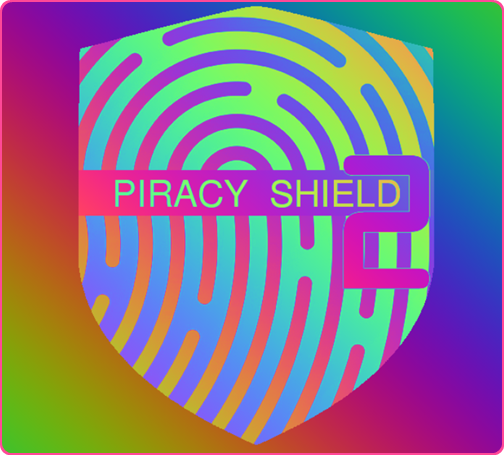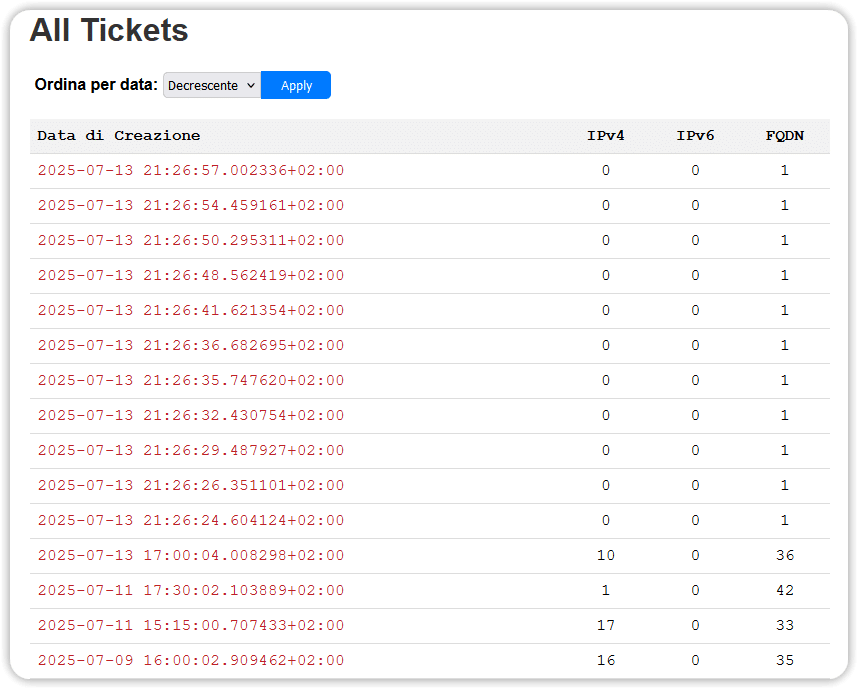 There hasn’t been much to report on the Piracy Shield front in recent weeks. After Napoli walked away with the title back in May, the Serie A season began winding down ahead of preparations to do it all over again in August.
There hasn’t been much to report on the Piracy Shield front in recent weeks. After Napoli walked away with the title back in May, the Serie A season began winding down ahead of preparations to do it all over again in August.
Unlike Serie A’s football players, Piracy Shield didn’t immediately disappear on a luxury vacation. Records show hundreds of fully qualified domains being blocked every two or three days until the second week of July, aiming to protect other live sports continuing through the summer.
Briefly listing just one domain per blocking ticket, semi-normal service was soon resumed when hundreds of domains and IP addresses were blocked to protect last weekend’s broadcast of the Hungarian Grand Prix.

Blocking will likely return to normal levels when the new Serie A season starts in August, but legal amendments adopted by AGCOM last week are likely to further increase Piracy Shield’s workload moving forward. Of course, that’s on the assumption that pirates don’t exhaust the dwindling supply of IPv4 addresses first.
Piracy Shield Widens Scope
It’s been understood for some time that Italy’s live blocking system would expand to protect a wider range of content. As regulator AGCOM noted in its most recent annual report, as much was written into Italian law.
“As known, in fact, Law No. 93/23 further expanded the scope of the Authority’s action by strengthening its functions for a more effective and timely countering of piracy actions online with reference to all events broadcast live on the network,” AGCOM wrote.
“To this end, the Authority will proceed, after public consultation, with the necessary amendments to the Regulations […] and with the technical activities of updating and implementing the live blocking platform (Piracy Shield) functionality to achieve the objectives set by the law.”
During a meeting on July 30, legislative amendments that among other things expand the availability of dynamic injunctions to rightsholders of all live events, were put to the vote. Despite notable opposition, the amendments were adopted by AGCOM.
“With these measures, it will be possible to disable access to illegally disseminated content, during the first thirty minutes of the transmission of live content and premieres of cinematographic and audiovisual works or entertainment programs, as well as similar audio works,” AGCOM confirmed.
Controversial Amendments
The usual methods of blocking – interference with DNS resolution for domain names and routing/blocking of network traffic for IP addresses – are familiar and set to continue. Other aspects of the amendments (Omnibus Decree/October 2024) are much more controversial and are set to come into play for the first time.
• Widened scope: VPN services and publicly available DNS providers are required to deploy blocking measures consistent with those already in place at ISPs. The requirement to block within 30 minutes applies regardless of a providers’ location or residence.
• Obligations for Indirect Providers: Information Society Service providers (ISS)* involved in any capacity in enabling access to an infringing site or service, are required to block access in response to orders from AGCOM, including those reported via Piracy Shield, within 30 minutes.
• Technological Measures: Even when online search engines and Information Society Service* providers are not involved in enabling access to infringing sites and services, notifications to disable access must be executed using “all necessary technical measures” within 30 minutes.
• As amended by the Ominibus Decree, the law clarifies that all recipients of disabling orders must use the Piracy Shield platform to ensure timely and effective action.
AGCOM’s definition of an ISS includes “mere conduit and hosting service providers, as well as caching service providers…..VPN service providers and publicly available DNS service providers, as well as search engine operators.”
* EU Directive 2015/1535 describes an Information Society Service (ISS) as a service normally provided for remuneration, at a distance, by electronic means and at the individual request of a recipient of services.
Early Warning For Rightsholders
Sanctions for non-compliance with AGCOM blocking orders still have no direct equivalent when rightsholders use Piracy Shield to block non-infringing IP addresses. AGCOM’s statement indirectly addresses this criticism, by confirming that it still takes overblocking seriously.
“[Reporters of infringing content] are still required to report on the Piracy Shield platform with the utmost diligence and rigor and to avoid reporting assets that present a high risk of overblocking. In the event of non-compliance with the requirements and conditions governing the operation of the Piracy Shield platform, the Authority will suspend accreditation to the same,” AGCOM notes.
As far as the law goes, nothing has changed. Service providers and other intermediaries can be penalized for not tackling infringement to the required standard, whereas penalties for blocking an innocent party are at AGCOM’s discretion.
Voices of Opposition
General concerns over Piracy Shield have been aired since its launch, but a January 2025 appeal by the Computer & Communications Industry Association to the European Commission ensured that concerns were also heard in Brussels.
The CCIA, which represents global tech firms including Amazon, Cloudflare and Google, later asked the European Commission to issue a detailed opinion to ensure Piracy Shield’s compatibility with EU law.
The EC’s response highlighted several concerns and strongly suggested that work needed to be done. Meanwhile, a lone voice inside AGCOM itself continues to oppose the platform.
Lone Voice Inside AGCOM
AGCOM Commissioner Elisa Giomi was appointed to the board of the regulator in September 2020 but despite the passing of time, a chasm remains between Giomi’s position on Piracy Shield and that of her colleagues. In addition to numerous transparency failings, Giomi believes that the public resources consumed by the project are disproportionate, with any benefit returned to a small group of interested parties.
For more than two years and at every stage, Giomi says she has voted against Piracy Shield, despite “the often virulent reactions of colleagues.” The Commissioner’s position clearly hasn’t changed much since she went public last November; during the vote last week, Giomi voted against adopting the amendments.
With a new sanctioning procedure on the horizon, “for infringements of copyright and related rights by Audiovisual Media Service Providers,” increasing regulation led to the definition of an Audiovisual Media Service Provider being expanded recently.
If a user of YouTube or any social media platform reaches 500,000 followers, or their videos average one million monthly views, they can be personally categorized as an Audiovisual Media Service Provider, and therefore subject to AGCOM regulation.
Commissioner Giomi voted against adoption of this influencer-focused measure but, once again, appears to have been outnumbered. She’s making her opinions known on LinkedIn.
From: TF, for the latest news on copyright battles, piracy and more.
Powered by WPeMatico
